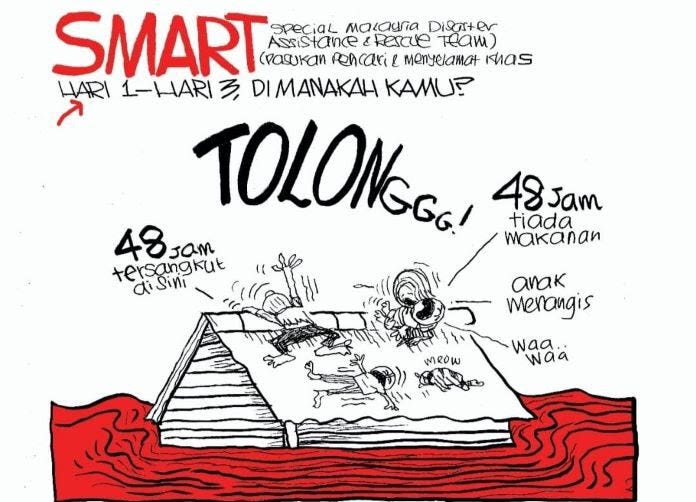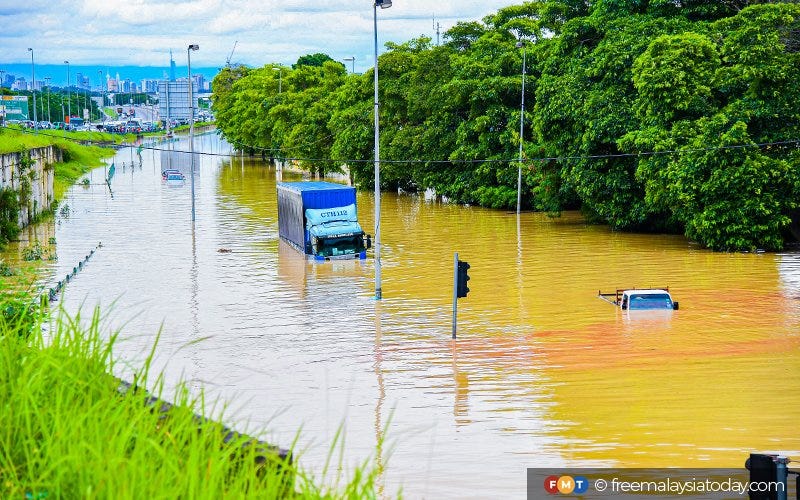Floods expose catastrophic failure in public policy
Poor planning, slow response, lack of empathy
Permatang Pauh MP Nurul Izzah Anwar’s warning to the government to prepare for the approaching monsoon season last July, went totally unheeded. In what is being described as the worst floods to hot Malaysia sine 1971, there have been at least eight deaths reported and as many as 64,000 people displaced from their homes. Thousands are stranded on the roofs of their homes, some waiting days for rescue. Cases of Covid-19 are rapidly rising in flood relief centers. Markets and supermarkets under flood waters, particularly in Kuala Lumpur and Selangor, is causing many families to go hungry. Some people are so desperate that supermarkets have been looted.
With no warning from the government that flooding would be this severe, anger at the government is at an all-time high.
Floods in Malaysia are an annual event, particularly along the East Coast. This year has been the worst in many years with 10 percent of the annual rainfall, occurring over a 24 hour period in many locations. Clogged drains, and catchment channels were all inadequate for the downpours. Millions of Malaysians have been affected, suffering with what appears to be little empathy coming from the government.
The November 2010 floods in the north and east coast of the country, aroused some debate about preparing for major floods. Some token projects like the Timah Tasoh Dam to Kuala Perlis dam run off channel were knee-jerk reactions. Due to the lack of flood mitigation studies undertaken before these projects were commenced, its really unknown how effective they will really be. The 2010 warning didn’t lead to any development of a flood mitigation plan across the country. Today, the nation is sadly seeing the consequences of lack of planning.
Environmentalists over the media are claiming the floods are the result of climate change. However, poor public policy seems to be a major contributor to the flooding. Logging in many strategic catchment areas has been going on unabated for decades. Even cultivated land with runner and palm oil doesn’t have the ground absorbing effect that natural jungle does. Water catchment and drainage infrastructure projects so vital in times like this were by-passed for other infrastructure projects that were commercially lucrative for certain parties. Both the 11th and 12th Malaysian Plans gave little priority to flood mitigation infrastructure.
Road, highway, industrial and urban development lacked the necessary environmental impact studies that would prevent the landslides seen over the last couple of days. Drains in flood prone areas were not cleared in time for the excessive rains.
Likewise, the government has been very slow to respond to emergencies. People have been stranded on the tops of their homes, The Welfare Department (JKM) is making excuses that its role is limited to creating temporary relief centers, and not providing food to people stranded in their homes. There are already claims of corruption that politicians are benefitting in catering operations to feed people evacuated in some areas.
The government has been caught with its pants down over poor planning and response to this disaster. The scenes of the Dewan Rakyat Speaker Azhar Harun disallowing a parliamentary debate on the flooding, added to the criticism the government lacked empathy for the people suffering in this crisis.
Prime minister Ismail Sabri announced an RM100 million allocation to handle this disaster with RM1,000 going to each household directly affected by the flooding. He also announced that GLCs including Petronas, Celcom, Telekom Malaysia, Sime Darby, CIMB, UEM, and Khazanah Nasional would contribute RM 50.8 million to the crisis, a doubling of the announcement he made the day before.
Some are seeing this as a response to the new Malaysian United Democratic Alliance (MUDA) raising more than RM1 million for flood relief, and other political parties down at the flood affected areas handing out aid. Malaysians themselves have embraced the disaster and helping others across the country. Some individuals have created their own mini relief centers, others are rescuing stranded people, while others are delivering much needed food. This is all being done without the racial hallmarks of the country’s politics in a spirit of common brotherhood.
The disaster highlights the poor level of governance in Malaysia. If one reviews the thousands of comments on social media there is a strong sense of feeling totally letdown by the government. The floods and perceived poor handling of the Covid-19 pandemic has highlighted the weakness of government in delivering basic safety to the people. It exposes a void in public policy, where many are angry that the government has just not done its job.
Click on subscribe so articles can be directly emailed to your inbox:






